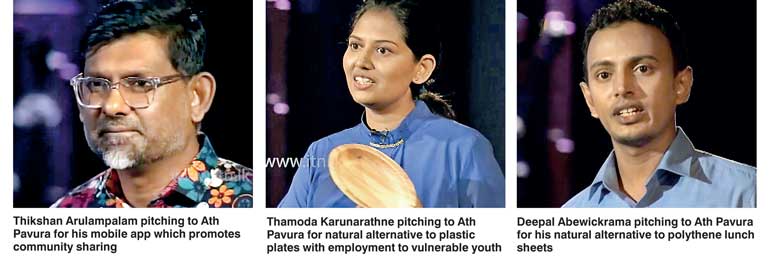Friday Apr 18, 2025
Friday Apr 18, 2025
Tuesday, 10 October 2017 00:10 - - {{hitsCtrl.values.hits}}

For the past two years, Social Enterprise Lanka (SELanka) and Lanka Impact Investing Network (LIIN) together with ITN have been working to develop the new hit TV show Ath Pavura (Wall of Tuskers) which airs on ITN every Sunday 9:30 p.m. Let me set the record straight once and for all, it has absolutely nothing to do with the UNP.
Ath Pavura is a factual TV show where social entrepreneurs pitch their new social business ideas or plans for expansion to five Impact Investors, who are called the Tuskers. What is unique and exciting about the show is that these tuskers decide then and there to invest or not. You can watch the episodes so far on our YouTube channel www.youtube.com/c/ATHPAVURA.
We are actually doing what the Government should be doing, “promoting entrepreneurship”. Ath Pavura is even greater because we are promoting social entrepreneurship, the undeniable future of business and development.
For the first time in the history of Sri Lanka, we have democratised the modern start-up culture which was confined to the English-speaking, urban, tech community. Ath Pavura brings to light the ordinary Lankans from across the country, from all walks of life who have the desire to solve social and environmental problems combined with the spirit of entrepreneurship.
Ath Pavura is also disrupting how entrepreneurs are funded. Chandula Abeywickrema, the pioneer of introducing “Impact Investing” to Sri Lanka, reminds us that entrepreneurs can’t thrive under debt. Entrepreneurs need real venture capital. Ath Pavura only provides private equity investments which allows the investor to be part of the social business and develop it together, but the primary objective is to create social-environmental impact.
We have now proven there are thousands of aspiring and existing social entrepreneurs in Sri Lanka. The research and the results are shown every Sunday on primetime TV. The proof, the evidence, the facts are all there. The public response is overwhelmingly positive as anybody can see from the social media reactions. We now need three key things to fast track the social enterprise ecosystem in Sri Lanka.
1. A separate legal identity for social enterprises
Social enterprises don’t fit into any of the existing business registration models. They are not hard commercial enterprises nor charities nor traditional NGOs. (The conservative definition of for-profit vs. not-for-profit needs a new interpretation.)
Therefore, the very first thing we need from the Government is to introduce a suitable incorporation for them. Unlike the current limited liability companies, social enterprises need to be clear about their purpose. They can’t just do whatever they want and whenever they want. Limited by Guarantee model has its own shortcomings and is not favourable for any serious investments needed for serious scale-up.
But like any private limited company, social enterprises also need to generate profit. However, the core-purpose of any SE is not profit maximisation, but to solve a specific social and/or environmental problem. And to demonstrate that, there needs to be a dividend cap, which enforces a uniform percentage of profit being reinvested back in the company’s mission.
For example, in the UK, at least 65% of year-end profit needs to be reinvested in the company’s mission (which means up to 35% can be distributed as dividends among the shareholders). The exact percentile split needs to be adjusted to the Lankan context. For example, we may start at 51% and move up as the sector grows.
Similarly, there needs to be an asset lock which prevents the shareholders from acquiring assets and then sharing those assets at the event of liquidation. We have seen both private companies and NGOs using the “social” label to acquire vast amounts of assets for private gains. An asset lock enforces that any asset remaining after paying liabilities can only be transferred to another asset locked body preferably with a similar mission. The purpose of a SE is not to accumulate more and more assets, but to use all assets optimally to create social impact.
There are some more nitty-gritties such as impact reporting, etc., but this can be done fairly easily by altering the standard Limited Liability constitution. The only structural addition needed is a separate unit under the Registrar of Companies to monitor the social enterprises’ adherence to their legal and impact reporting requirements.
We don’t have to reinvent the wheel by appointing a 10-member expert committee who will take 10 more years to tell us what other countries have already done. We need this to happen by the end of 2018.
2. Social impact bonds and new financial instruments
What the Government needs to understand is that social enterprises are essentially doing social service, environmental service, public service and contributing to GDP, while creating employment! Social enterprises are a huge asset for the Government because they are helping the Government to do their job. So, if the Government is smart, it should create more and more opportunities for social enterprises to thrive.
There’s not much point in creating a legal model if it doesn’t offer incentives exclusively to that model. We need the Government through the Central Bank and state banks to issue Social Impact Bonds to raise capital which will be used to fund only social enterprises to achieve pre-agreed and measured outcomes. This will allow the Government to save public spending on identified social and environmental problems. This way, the Government does not have to spend public money, and the returns to investors come from the cost savings. It’s a win-win-win.
We also need the Government to gazette a mandatory score for social enterprises in all government procurement. In other words, the Government and all public institutions should give an additional score for legally-registered social enterprises when evaluating tenders. For example, a social enterprise which is already delivering measured social impact in the healthcare space, thereby saving an X amount of government expenditure, will stand a higher chance of winning a healthcare related contract. This will enable the social enterprises to scale their impact. This can be independently adopted by the large corporations right away.
We don’t need special tax incentives as we expect the social enterprises to operate as commercial businesses, and not as charities. Social enterprises need to run as commercially competitive businesses.
3. Teach social enterprise in schools and universities
This is the most important need. The only way we can face the imminent challenges in the future is by changing how we do business and everyday living. We need to build the next generation of Lankans with the insight of the global and local problems. We need them to understand and live by the principles of sustainability. We need them to be equipped with the knowledge, skills and tools to solve social, environmental and economic problems using a market-based approach.
And to do that we need to start teaching them about social-environmental problems, sustainability, social innovation, social enterprise, circular economy and many more modern concepts and practices from primary level all the way to the university level. We need the students to answer exam questions about global poverty, ocean pollution, climate change, water crisis, domestic violence and the ever-growing world problems.
We want the students to study about how innovative people around the world and in Sri Lanka are trying to solve those problems through social innovation and through enterprise. We need to have school level and university level social entrepreneurs who will learn by practice what it takes to be a social entrepreneur at a young age.
What we don’t want is unnecessary Government intervention and regulation. We don’t want a separate minister with a fleet of political appointees warming seats inside a glass-cladded office and a car park full of latest SUVs. We don’t want bureaucrats trying to teach the social entrepreneurs how to do their business. We don’t want to create crippling power structures, cronyism and collusion as we see in all other sectors. Please let’s do this one important thing, right. We have an opportunity to create a new sustainable future for our country. We need to do this right for the sake of our future generations.
SELanka, LIIN, Good Market and Lanka Social Ventures are the key stakeholders in this space working together with a shared vision of building a thriving social enterprise sector in Sri Lanka by the year 2025. We collectively possess the knowledge and commitment to make it happen and we now welcome the government to do their part in partnership with us.
(Ath Pavura TV show is sponsored by Hatton National Bank, Dialog Axiata PLC, Horizon Campus and Wijeya Newspapers; and supported by the Good Market and Youth Business Sri Lanka.)
(The writer is Founder of Social
Enterprise Lanka.)
Discover Kapruka, the leading online shopping platform in Sri Lanka, where you can conveniently send Gifts and Flowers to your loved ones for any event including Valentine ’s Day. Explore a wide range of popular Shopping Categories on Kapruka, including Toys, Groceries, Electronics, Birthday Cakes, Fruits, Chocolates, Flower Bouquets, Clothing, Watches, Lingerie, Gift Sets and Jewellery. Also if you’re interested in selling with Kapruka, Partner Central by Kapruka is the best solution to start with. Moreover, through Kapruka Global Shop, you can also enjoy the convenience of purchasing products from renowned platforms like Amazon and eBay and have them delivered to Sri Lanka.
Discover Kapruka, the leading online shopping platform in Sri Lanka, where you can conveniently send Gifts and Flowers to your loved ones for any event including Valentine ’s Day. Explore a wide range of popular Shopping Categories on Kapruka, including Toys, Groceries, Electronics, Birthday Cakes, Fruits, Chocolates, Flower Bouquets, Clothing, Watches, Lingerie, Gift Sets and Jewellery. Also if you’re interested in selling with Kapruka, Partner Central by Kapruka is the best solution to start with. Moreover, through Kapruka Global Shop, you can also enjoy the convenience of purchasing products from renowned platforms like Amazon and eBay and have them delivered to Sri Lanka.